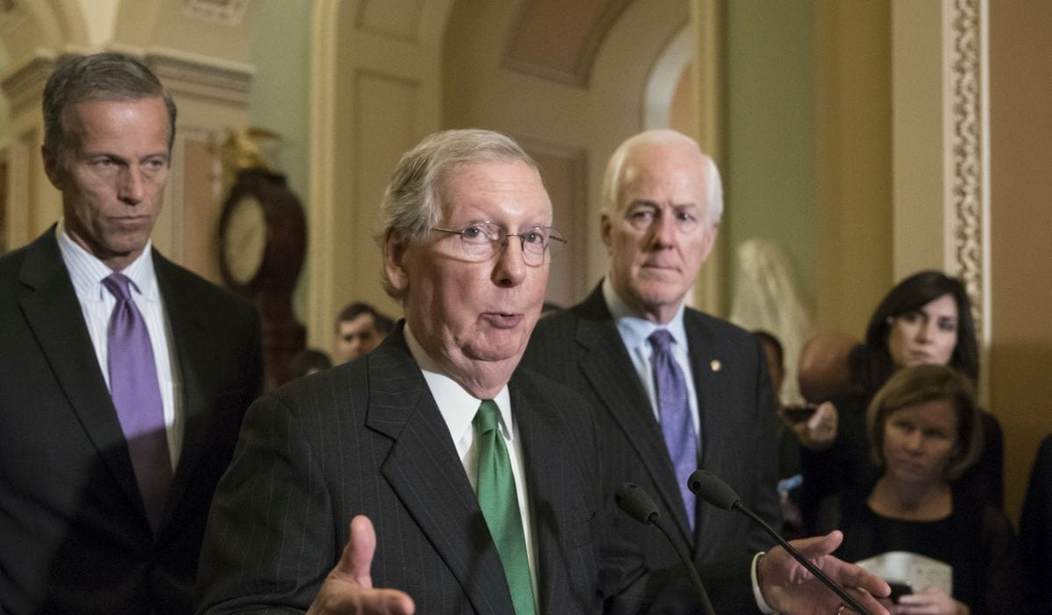Senate Republicans finally got their act together enough to pass an historic tax reform bill that is intended to grow the economy, create jobs, and make American businesses more competitive.
The vote was 51-49, with Senator Bob Corker refusing to vote for the legislation because he said it would add too much to the deficit.
The keys to passage were several last-minute changes to the bill that convinced undecided senators to vote for it.
After winning over last-minute holdouts, Senate Republicans early Saturday approved a massive tax overhaul that provides more than $1 trillion in tax cuts over ten years, revamps corporate and individual tax rates, expands some credits and eliminates some popular deductions.
[…]
Other Republicans who were withholding their support as recently as Thursday supported the bill. Sen. Ron Johnson of Wisconsin secured changes that would increase cuts for business owners who pay their taxes on personal rather than corporate returns.
Sen. Susan Collins of Maine got a deduction for up to $10,000 in property taxes included in the bill, which otherwise eliminates deductions for state and local taxes. Collins also got a commitment that the Senate would vote on bipartisan insurance changes to stabilize the individual market before the tax bill is sent to Trump.
Sen. Jeff Flake said he won changes to the provision for businesses to write off equipment purchases and a commitment that the Senate would move to protect undocumented immigrants who came to the United States as children from deportation.
A comparison of the House and Senate versions of the bill shows just how far apart the two sides are:
— Personal income tax rates: Senate bill retains the current number of brackets, seven, but changes them to 10, 12, 22, 24, 32, 35 and 38.5 percent. Under current law, the top bracket for wealthiest earners is 39.6 percent. The House measure condenses seven brackets to four: 12, 25, 35 and 39.6 percent. Under the Senate bill, the reductions in personal income tax rates are temporary, ending in 2026. They’re permanent in the House bill.
— Standard deduction: Used by about 70 percent of U.S. taxpayers, currently $6,350 for individuals and $12,700 for married couples. Senate, House bills both double those levels to $12,000 for individuals and $24,000 for couples.
— Personal exemption: Both bills eliminate the current $4,050 personal exemption.
— State and local taxes: Senate, House bills end federal deductions for state and local income and sales taxes, but they allow the deduction for up to $10,000 in property taxes.
— Tax credits: Senate doubles per-child tax credit to $2,000. House raises per-child tax credit from $1,000 to $1,600, extends it to families earning up to $230,000. Creates a $300 tax credit for each adult in a family, which expires in 2023. Both bills preserve the adoption tax credit.
— Home mortgage interest deduction: Senate retains the current limit for the deduction to interest paid on the first $1 million of the loan. House reduces the limit to $500,000, for new home purchases.
— Other deductions: Senate bill preserves deduction for medical expenses not covered by insurance but ends deductions for moving expenses and tax preparation. House eliminates medical expense deduction.
— Individual insurance mandate: Senate bill repeals the requirement in Democrat Barack Obama’s health care law that people pay a tax penalty if they don’t purchase health insurance. House bill does not.
— Alternative minimum tax: The AMT is aimed at ensuring that higher-earning people pay at least some tax. Senate bill doesn’t repeal it but reduces the number of people who have to pay it. House measure repeals the tax.
— Inheritance tax: Currently, when someone dies the estate owes taxes on the value of assets transferred to heirs above $5.5 million for individuals, $11 million for couples. Senate bill doubles those limits but does not repeal the tax. House initially doubles the limits and then repeals the entire tax after 2023.
There are also significant differences between the House and Senate in so-called “pass through” provisions for small businesses.
There is also trouble brewing in “PAYGO” provisions in the Senate bill. In order for the tax bill to be considered, Republicans had to add billions in spending cuts to bring it under the $1.5 trillion deficit trigger. The cuts are in social programs like Medicare, Social Security, and welfare.
The cuts look impressive — except they’re not real. If Congress were to cut those programs by the amount stipulated in the bill, millions of people would lose benefits. So, to avoid PAYGO, Congress must waive its provisions, something they’ve done 16 previous times.
Democrats, however, are looking for revenge and may withhold their votes on the waiver, threatening to saddle the GOP with disastrous spending cuts.
But within the GOP, leaders are confident that once the tax bill is passed, they can strike a quick deal to waive the federally mandated cuts. But Democrats deeply opposed to the tax bill aren’t making any promises they’ll agree to bail out their rivals — raising the risk of a historic gutting of government programs.
“This would be unprecedented,” said William Hoagland, a senior vice president at the Bipartisan Policy Center and a former GOP Senate staffer with expertise on the budget. “The law never envisioned that we’d eliminate programs.”
GOP leaders are asking moderates like Susan Collins (R-Maine) to back the tax package with the mere promise that lawmakers can find a bipartisan solution during an already divisive year-end crunch that could lead to a government shutdown.
One senior House GOP source was confident a deal on spending would go through. “A statutory PAYGO sequester has never happened, and we will prevent one from being triggered,” the source said, adding that Congress has until the end of the year to work it out.
The far reach of the Republican tax plan is the consequence of limitations placed on Congress under the “pay-as-you-go” rule. The decades-old law, revamped during the Obama presidency, requires Congress to offset the cost of each piece of legislation or risk spending cuts painful to both parties.
Lawmakers have repeatedly voted to waive this rule, a total of 16 times, for major bills like the Obama-era stimulus and multiple tax cut packages under George W. Bush.
The GOP’s $1.5 trillion tax plan would trigger $150 billion in cuts to domestic programs every year for a decade if Congress doesn’t step in, according to the CBO. That would include $25 billion from the money Medicare pays health care providers.
For the Democrats, it would be a huge political risk to refuse to go along with waiving PAYGO and preventing the massive cuts in popular programs. That’s why they’ll probably go along with it in the end.
But this is really a political sideshow to the main event — the passage of massive tax cuts for the first time in more than a generation. I don’t think too many of us thought that Mitch McConnell had it in him to ramrod this bill through the Senate. But there is little doubt that he and his lieutenants deserve the lion’s share of the credit for getting the bill to the finish line.










Join the conversation as a VIP Member